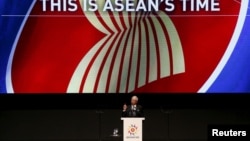Leaders from the 10-nation Association of South East Asian Nations (ASEAN) meeting in Malaysia this week offered an upbeat assessment of the plan to launch an ASEAN Economic Community next year.
The regular summits of the ASEAN are broadly focused on steps to boost cooperation and trade among the 10-nation regional bloc, but in recent years it is their differences that have dominated high-profile meetings.
In particular, China’s expansive territorial claims in the strategic and oil-rich South China Sea have led to sharp divisions among ASEAN members.
Recent satellite images have shown reefs being dredged, and construction underway in the disputed Spratly Islands. Analysts say China is fortifying the islands with military bases and airstrips.
Over many years ASEAN member states the Philippines, Vietnam, Malaysia and Brunei also have made claims to the region, along with Taiwan.
Malaysian leader Najib Razak told local reporters ASEAN leaders had hoped to convince Beijing it is in its interests to avoid confrontation with ASEAN and any destabilizing of the region would also not benefit China.
But ASEAN’s position triggered a strong rebuttal by China. Chinese Foreign Ministry spokesman, Hong Lei, said China “expressed serious and deep concerns" over the ASEAN summit’s comments on the South China Sea.
Hong said China’s position on the South China Sea was “consistent and clear,” and not a matter between China and ASEAN, with China seeking to solve the issues in question on a basis that respects the facts of history and international law.
Since 2002 ASEAN and China have sought to negotiate a Code of Conduct to ensure regional states’ economic and territorial interests in the disputed seas were safeguarded. Talks began in 2012 but little headway has been achieved.
Thailand-based economist Somphob Manarangsan, said China is likely to press ahead with its maritime policy, despite concerns raised by ASEAN leaders, with China using economic and security policies as both punishments and rewards for each country.
“China has also proposed the Silk [trade] Road, the maritime Silk road policy and also the Asian Infrastructure Investment Bank [AIIB]. At the same time they are quite aggressive on the South China Sea movement. So it’s like the stick and carrot policy implemented by China. But I don’t think that they are going to retreat from their maritime policy like that,” he stated.
Somphob said China’s stance may lead to more conflict over the disputed waters. Somphob said that because members states are split over whether they support Beijing’s claims or not, that has led to fragmentation within ASEAN over adopting a common position on China, even as their economic dependency on Beijing grows.
Host nation Malaysia gave an upbeat assessment about the region’s economic prospects, predicting growth of nearly five percent in 2015, buoyed by stronger foreign direct investment.
But despite rosy predictions over economic growth, and the prospects for tighter economic integration in the coming years, there are signs that domestic political issues are posing a challenge for the bloc.
With continuing border disputes and controversies over a series of huge hydroelectric dams on the Mekong River, there are signs that ASEAN is struggling to address even those challenges that do not involve regional power-broker China.
Chulalongkorn University political scientist, Thitinan Pongsudhirak, an observer at the meeting in Malaysia, said ASEAN appears to be facing a loss of confidence.
“You have the domestic challenges within key countries, Thailand, Myanmar, Malaysia and Indonesia with its pre-occupation on the developing maritime capacity and the Philippines. When you add them up, external geopolitical, geo-economic, regional - too much focus on the AEC [Asian Economic Community] and not really prepared - then you have unchartered waters that ASEAN is moving into, not with a lot of confidence, but a lot of apprehension and anxiety,” he explained.
Thitinan said amid fears over a loss of momentum will add pressure on Laos in 2016 when it takes over the ASEAN chair, in which China is now the leading foreign investor.
Analysts say any conflict over the South China China Sea’s waters could impact major shipping lanes and undermine the region’s bright economic prospects.












